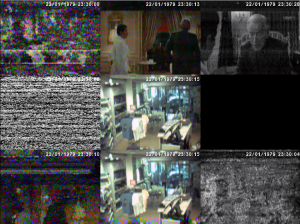
A simple way to combine multiple video’s on one screen.
We looked around for simple tools to make a splitscreen in multiple parts, not just two, but with more fragments, so that the final result would be a checkerboard with small video’s. Unexpectedly it was hard to find. Finally, turned out it is a job of 5 minutes for our beloved Cinelerra.
[…]
Comments Off on 9 video splitscreen Posted on: Wednesday, December 29, 2010
by: Peter in category: Editing software, Manuals, News, Problems and solutions

(from VideoLan News)
VLC users survey
2010-12-16
The VideoLAN project and the VLC development team would love VLC users and community to help them in understanding the users and their needs.
Please fill the VLC users survey. It is quick and is completely anonymous.
Comments Off on VLC users survey Posted on: Tuesday, December 28, 2010
by: Peter in category: News
The Apertus project aims to create a powerful, free and open (in terms of liberty) cinema camera that filmmakers love to use. The project is based on the Elphel open source camera.
The Apertus website has a new sub site ‘about the research to achieve a 100% free software workflow to post-process video under Linux.’
So there is one project that sounds worth supporting! There is F/LOSS video editing / transcoding / processing software, there are open codecs, hardware is being worked on … And filmmakers need to be able to somehow tie the bits together in a workflow.
[…]
Comments Off on GPL workflow Posted on: Thursday, December 23, 2010
by: Peter in category: Copyrights and licenses, Editing software, Hardware, News

March 24-25, 2011, University of Oxford, UK
Welcome to Remix Cinema: the collaborative making, deconstruction and distribution of digital artefacts, a workshop exploring the role of audio-visual remix practices in contemporary digital culture.
Organised by the Oxford Internet Institute – OII (University of Oxford) in collaboration with UNIA Prácticas y Culturas Digitales (Universidad Internacional de Andalucía – UNIA) and funded by the Beyond Text programme of the Arts & Humanities Research Council – AHRC, this workshop will take place on 24th and 25th March 2011 in Oxford.
Context
In August 2010, the remix movie Star Wars Uncut was the first user-generated production to win an Emmy Award. Other online platforms such as wreckamovie.com enable online communities to form for independent and open source film making, harnessing distributed forms of collaborative co-creation rather than relying on traditional organisational structures. Cloud-based editing suites have begun appearing: Stroome.com was launched in April 2010 by USC Annenberg with the tag-line “mix it up. mash it out”. Digitalised photos, videos, and sound, easily accessible through popular websites, constitute a diverse online repository of content that is being used for artistic remix purposes. Recently, the Electronic Frontier Foundation won a court case giving exemptions from the Digital Millennium Copyright Act (DMCA) anticircumvention provisions to amateur remix video artists sharing their works on e.g. YouTube. VJ’s and live cinema artists (e.g. Dj Spooky, Eclectic Method or SOLU) have permeated multiple cultural settings, ranging from mainstream contexts of entertainment to museums and other spaces devoted to the institutionalisation of art practices.
The examples outlined are just a few fitting under the umbrella term of “Remix Cinema”, and point to ways in which networked devices and resources are facilitating new artistic audiovisual practices and cultures. The concept of ‘remix’ describes a broad set of social and cultural practices centred around the fragmentation and re-ordering of already existing and new content, whether text, sound or images. This 2-day multi-disciplinary workshop focuses on these diverse creative practices, particularly in the context of the contemporary socio-technical media environment. It brings together people interested in understanding and shaping remix cinema: doctoral students, established scholars, practising artists, and anyone else interested in addressing themes related to questions including:
* How is the contemporary media-scape influencing artistic audio-visual creation?
* What can we learn from the changing practices in remix cinema?
* How are new models of economic support (e.g. crowdfunding) changing productions of cultural objects?
* What methodological and theoretical challenges arise in empirical studies on remix cinema, and how do we overcome these?
Call for presentations & papers
The workshop committee welcomes proposals on any social, critical, cultural, aesthetic, political, technical, economic or legal aspects of remix cinema practices, cultures and works. We particularly welcome contributions that report on empirical studies and adopt innovative methodological approaches. Each presentation should last for a maximum of 15 minutes. Participants may present finished studies or works-in-progress, as the workshop also serves as a forum for gaining valuable feedback and exchanging ideas. All proposals will be peer reviewed by at least two members of the workshop’s academic committee (Oxford Internet Institute faculty).
Presenters are invited to submit full papers which will be eligible for review and possible inclusion in a subsequent ISBN publication on remix cinema.
Deadlines
* Abstract deadline: January 7, 2011; 500 words to be submitted here (please note that the link will open in a new window).
* Notification of acceptance of abstracts: January 28, 2011.
* Registration deadline: February 4, 2011.
* Full papers (optional) submission deadline: March 7, 2011 (4000-6000 words).
* Presentation materials submission deadline: March 15, 2011.
http://remixcinema.org/
Comments Off on Remix Cinema workshop Posted on: Saturday, November 20, 2010
by: Peter in category: Collaborative filming, Copyrights and licenses, Films and Projects, News, Workshops
 .
.
Something to look out for: A promising project that is still in a very early stage.
Unlogo is a web service that eliminates logos and other corporate signage from videos. On a practical level, it takes back your personal media from the corporations and advertisers. On a technical level, it is a really cool combination of some brand new OpenCV and FFMPEG functionality. On a poetic level, it is a tool for focusing on what is important in the record of your life rather than the ubiquitous messages that advertisers want you to focus on.
Unlogo is an FFMPEG AVFilter that attempts to block out corporate logos using OpenCV 2.1 and an awesome ‘plugin’ framework for FFMPEG developed by Michael Droese. Thanks to open licensing it can borrow some good ideas from neighbouring projects. (Check also Julien Oliviers project The Artvertiser)
More on planning, code development: http://code.google.com/p/unlogo/
The project needs your money. If you feel like donating; there is a Kickstarter campaign running to fund the project.
Comments Off on Unlogo, the Corporate Identity Media Filter Posted on: Monday, September 13, 2010
by: Peter in category: Copyrights and licenses, Films and Projects, News
Motion script “st-gillis” #1 from Michael Murtaugh on Vimeo.
We started posting some clips made in the group meetings to the ‘Osvideo’ group on Vimeo.
Here’s two of them made on september 11, made with Motion, which selects the parts of an image in which motion is detected, and Python to draw the images as a sequence on a black background and combine them in a video.
Swingbox from Peter Westenberg on Vimeo.
Comments Off on St-Gillis in Motion by: Peter in category: Collaborative filming, Films and Projects
Article in La Liberation on the intervention of artist Tania Bruguera who sells copies from video’s from the Centre Pompidou collection in the streets during exhibition Voir / Revoir.
Read article in French
Below a French to English machine translation
[…]
Comments Off on Buy cheap copies ! Posted on: Sunday, September 12, 2010
by: Peter in category: Copyrights and licenses, Films and Projects, News

3 weeks left to register!
Open Video Conference is a summit to explore the future of video on the web. It’s about building open source and open standards for online video, but it’s also about some larger questions: With so much free stuff out there, how will creators get paid? Who knows what you watch? Where is the medium going?
Oktober 1 + 2, Fashion Institute of Technology (FIT) in New York City. FIT is located on Seventh Avenue at W 27th Street, in the shadow of the Empire State Building.
With over 60 sessions on open source, creative storytelling, remix culture, public policy, and the future of video on the web, OVC is not to be missed.
With appearances of amongst others: Yes Men (media troublemakers), GML and Jamie Wilkinson and off course your faithful Active Archives team (Meet us at the session “Preserving Our Audiovisual Heritage: Archives Show and Tell” !)
Check out the conference schedule and some of the conference speakers.
The Open Video Alliance, founded in 2009, is a coalition of leading organizations dedicated to fostering the growth of open video on the web. For more, visit http://openvideoalliance.org
Comments Off on Open Video Conference 2010 coming soon ! Posted on: Tuesday, September 7, 2010
by: Peter in category: News
OPEN VIDEO
HTML5, the next revision of the HyperText Mark-up Language, is supposed to open a new chapter in web design and web-based publishing. The support of multimedia content by self-explanatory video and audio tags will have major impact for developers, designers and content producers.
Most importantly, it allows the seamless integration of open-source encoded audio and video content into the native browser environment. Furthermore, it opens up exciting and yet unforeseeable possibilities to revaluate and to re-invent the rather peculiar relationships between text, sound and moving or still image.
The Open Video project will research into past and present open-source video implementations with the goal to develop an independent platform that explores the specific potentials of self-authored and self-managed, open-source video publishing initiatives against the backdrop of the overwhelming dominance of mass-media like content providers.
Open video calls for code developers, web designers and digital content producers.
Advising researcher: Florian Schneider
Applications
Research candidates can apply for a one-year or two-year research period starting annually on 1 January. It is also possible to apply to do research for a different period and with a different starting date.
More info
Please visit our website at http://www.janvaneyck.nl (button ‘applications’) for more information
Comments Off on Open Video @ Jan Van Eyck Academie Posted on: Thursday, July 29, 2010
by: Peter in category: News

An object in the sky spreads radiation over North America. Fearing terrorism, U.S. Homeland Security agents are dispatched to investigate and contain the damage. What they discover will have implications for the entire world.
Pioneer One is the first ever ‘made for torrent’ series. Pioneer One is the latest project from Josh Bernhard and Bracey Smith whose previous indie feature The Lionshare, became VODO’s biggest success to date with over 450,000 downloads since its release. The success of the project inspired the writer/director duo to develop this quality drama in collaboration with VODO and its distribution partners. With a successful distribution of the pilot they’re hunting for the donors and sponsors that will make the continuation of the show possible.
Direct downloads, Torrents, streaming and more info:
http://vodo.net/pioneerone
License:
Creative Commons Attribution, non commercial, Share alike
[…]
Comments Off on Pioneer One Posted on: Tuesday, June 22, 2010
by: Peter in category: Films and Projects, News






Recent Comments